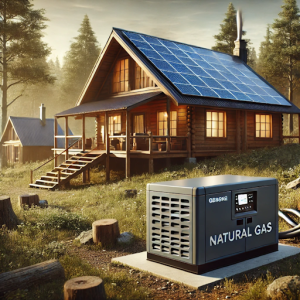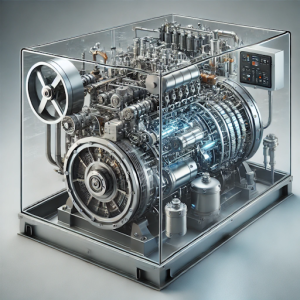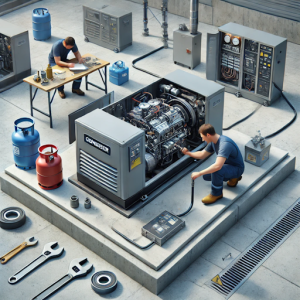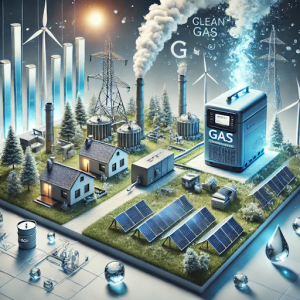Explore the Benefits of Natural Gas Generators for Sustainable Off-Grid Power Solutions
Natural gas generators stand out as an exceptional choice for individuals seeking a reliable energy source for their homes or cabins located in remote areas. Understanding the different power generation methods is crucial as you embark on your off-grid journey. The distinct advantages of natural gas generators—including their remarkable reliability, cost-effectiveness, and eco-friendly attributes—make them an attractive option for off-grid living enthusiasts who prioritize sustainability and operational efficiency. By harnessing natural gas, you can enjoy a continuous power supply that aligns with your environmental values while ensuring comfort and convenience in your off-grid lifestyle.
As technology continues to evolve, the concept of off-grid living has become increasingly appealing to many. Whether motivated by a commitment to sustainability, the quest for autonomy, or the desire for a self-sufficient lifestyle, disconnecting from the traditional power grid can be a deeply rewarding experience. Off-grid power solutions allow you to tap into renewable resources or alternative fuels, enabling a comfortable living experience that is independent of conventional electricity sources and promoting a lifestyle that respects nature.
By equipping yourself with the right knowledge and preparation, you can seamlessly integrate a natural gas generator into your off-grid living setup. This ensures that your essential energy needs are consistently met, providing you with peace of mind. This article will explore the countless benefits of natural gas generators, clarify how they operate, and outline important considerations for selecting and installing them in your off-grid environment.
 Maximize Your Off-Grid Power Potential with Expert Insights
Maximize Your Off-Grid Power Potential with Expert Insights
- Off-grid power solutions empower you to break free from traditional energy sources, making them essential for remote living or during unexpected power interruptions.
- Natural gas generators provide dependable and efficient energy production, with significantly lower emissions compared to diesel or gasoline options.
- These generators operate by combusting natural gas to produce mechanical energy, which is then converted into electrical energy through a generator system.
- When selecting a natural gas generator, it is crucial to evaluate factors such as power output, fuel efficiency, and maintenance needs to ensure optimal performance.
- Proper installation and consistent maintenance are vital for ensuring the safe and effective operation of your natural gas generator.
Discover the Exceptional Advantages of Natural Gas Generators for Reliable Power Generation
A defining feature of natural gas generators is their outstanding reliability. By selecting a natural gas generator to fulfill your off-grid energy demands, you can depend on a steady power supply that is specifically tailored to your needs. Unlike solar panels or wind turbines, which can be impacted by unpredictable weather conditions, natural gas generators deliver stable energy output, unaffected by external variables. This inherent stability ensures that you will have power when you need it most, a crucial aspect for those relying on electricity for heating, refrigeration, or medical devices.
The assurance that your generator will provide power during critical times brings significant peace of mind. In addition to their reliability, natural gas generators offer considerable cost savings. Although the initial investment may exceed some alternative off-grid solutions, the long-term financial benefits can be substantial. Natural gas is frequently more affordable than gasoline or diesel, resulting in reduced operational costs over time, while the maintenance requirements for natural gas generators are generally less demanding than those for other fuel types. This allows you to conserve both time and resources while enjoying a consistent and dependable energy source.
 Comprehend the Operational Mechanics of Natural Gas Generators
Comprehend the Operational Mechanics of Natural Gas Generators
Natural gas generators operate by converting the chemical energy found in natural gas into electrical energy through a combustion process. Once the generator is activated, natural gas is combined with air and ignited within the engine’s combustion chamber. This ignition generates high-pressure gases that drive the engine’s pistons, ultimately rotating the rotor of the generator and producing electricity. This operational methodology is particularly noteworthy for its efficiency and cleanliness in comparison to other fossil fuel options.
Key components of a natural gas generator include its fuel system, which typically features a regulator to manage gas flow and ensure optimal performance. Contemporary natural gas generators are equipped with advanced functionalities such as automatic start/stop mechanisms and remote monitoring capabilities. These technological innovations significantly enhance user convenience, allowing for better management of your power supply and simplifying your off-grid lifestyle.
Critical Considerations for Choosing the Right Natural Gas Generator
| Key Factor | Details |
|---|---|
| Power Output | Evaluate the generator’s power output requirements based on the specific appliances and devices you plan to operate. |
| Fuel Type | Consider natural gas as your fuel option due to its clean-burning and cost-effective nature. |
| Size and Portability | Select a generator size and portability that align with your available space and mobility needs. |
| Noise Level | Assess the generator’s noise output to ensure it meets acceptable standards for your living environment. |
| Start-up Mechanism | Choose between manual or automatic start-up options depending on your convenience and usage frequency. |
When selecting a natural gas generator for your off-grid setup, there are several critical factors that warrant careful evaluation. Firstly, accurately assess your power needs. Calculate the total wattage necessary to support your essential appliances and devices, ensuring that the chosen generator can handle the load effectively. It is advisable to opt for a generator with a slightly higher capacity than your calculated requirements to accommodate any sudden spikes in power demand.
Another vital consideration involves the generator’s portability and installation requirements. If you intend to relocate your generator frequently or use it in various locations, look for a lightweight and easily transportable model to facilitate mobility. Furthermore, think about whether you prefer a stationary installation or a portable unit that can be conveniently set up according to your specific needs. Lastly, consider the generator’s noise level; quieter models can greatly enhance your off-grid experience by minimizing disturbances and preserving the tranquility of your natural surroundings.
 Essential Guidelines for Installing and Maintaining Natural Gas Generators
Essential Guidelines for Installing and Maintaining Natural Gas Generators
The installation process for a natural gas generator necessitates meticulous planning and execution to ensure safety and efficiency. Begin by identifying a suitable location for your generator while adhering to local regulations and safety guidelines. This location should be well-ventilated and sufficiently distanced from flammable materials to minimize risks.
You may also need to construct a concrete pad or platform to stabilize and protect the generator from moisture-related issues. After selecting the ideal location, connect the generator to your natural gas supply line. If you lack experience with gas line installations, enlisting professional assistance is highly recommended to ensure compliance with all safety standards.
Once the fuel connection is established, set up the necessary electrical connections to integrate the generator with your home’s electrical system. Regular maintenance is crucial for keeping your generator operating smoothly. This includes routine inspections of oil levels, air filter replacements, and spark plug checks to maintain peak performance and extend the life of your generator.
Cost Comparison: Analyzing Natural Gas Generators Versus Other Off-Grid Energy Solutions
When evaluating the costs associated with off-grid energy solutions, it is essential to conduct a thorough comparison between natural gas generators and other alternatives, such as solar panels and diesel generators. While solar energy systems have gained popularity for their renewable qualities, they often require substantial upfront investments in panels, batteries, and inverters. Additionally, solar systems may struggle to provide sufficient power during cloudy days or at night without adequate battery storage.
Conversely, diesel generators are known for their reliability; however, they incur higher fuel costs and more frequent maintenance needs compared to natural gas generators. Given that diesel fuel prices can fluctuate significantly, natural gas often presents a more stable and typically lower-cost option in many regions. A long-term expense analysis reveals that natural gas generators generally offer a more economical solution for individuals pursuing off-grid living solutions.
 Evaluating the Environmental Impact of Natural Gas Generators in Off-Grid Living
Evaluating the Environmental Impact of Natural Gas Generators in Off-Grid Living
As you consider your off-grid energy options, it is crucial to assess their environmental impact. Natural gas is often regarded as a cleaner alternative to other fossil fuels, such as coal or oil, due to its lower carbon emissions during combustion. By opting for a natural gas generator, you can significantly reduce your carbon footprint while enjoying dependable power for your off-grid lifestyle.
However, it is essential to recognize that natural gas remains a fossil fuel, and its extraction can lead to environmental challenges. Methane leaks during extraction and transportation present significant concerns regarding greenhouse gas emissions. To mitigate these issues, prioritize sourcing natural gas from reputable suppliers who are committed to sustainable practices and environmental responsibility.
Moreover, incorporating renewable energy sources alongside your natural gas generator can further demonstrate your commitment to environmental sustainability and responsible energy consumption, enhancing your overall off-grid living experience.
Real-Life Success Stories: Natural Gas Generators in Off-Grid Living
Analyzing real-world examples can provide invaluable insights into how natural gas generators have been effectively integrated into off-grid living scenarios. For example, many rural homeowners have successfully transitioned to natural gas generators as their primary power source after facing frequent outages from traditional utility services. The adoption of these generators has enabled them to achieve energy independence while ensuring a reliable electricity supply for heating, cooling, and essential appliances.
Another compelling case involves remote cabins that depend on natural gas generators for seasonal use. Given their isolated locations, these cabins often lack access to conventional power sources. Natural gas generators allow cabin owners to enjoy modern conveniences such as refrigeration and lighting without compromising their connection to the natural environment.
These success stories illustrate how natural gas generators can effectively support off-grid living, providing both comfort and reliability. As you embark on your journey toward off-grid living, consider the extensive benefits that natural gas generators offer. From their dependability and cost-effectiveness to their relatively lower environmental impact, these generators can play a vital role in achieving energy independence.
By carefully selecting the right model for your particular needs and adhering to proper installation and maintenance protocols, you can smoothly transition into an off-grid lifestyle powered by natural gas.
Addressing Common Questions About Natural Gas Generators
What are the key features of a natural gas generator suitable for off-grid use?
A natural gas generator designed for off-grid living is a power generation system that utilizes natural gas as a fuel source to produce electricity in remote areas where access to the main power grid is limited or non-existent.
How does a natural gas generator operate in off-grid environments?
A natural gas generator intended for off-grid applications works by combusting natural gas within an internal combustion engine. This combustion generates mechanical energy, which is subsequently transformed into electrical energy via a generator. The produced electricity can power a variety of appliances, equipment, and lighting in off-grid settings.
What are the primary benefits of using a natural gas generator for off-grid living?
The key advantages of utilizing a natural gas generator for off-grid living include:
– Reduced fuel costs compared to diesel or gasoline generators
– Cleaner combustion that leads to lower emissions
– Continuous fuel supply sourced from natural gas pipelines
– Lower maintenance requirements compared to other fuel types
What considerations should be made when using a natural gas generator for off-grid living?
Important considerations when using a natural gas generator in off-grid scenarios include:
– Availability of natural gas supply in your area
– Initial installation and equipment costs
– Regular maintenance and servicing requirements
– Environmental implications and compliance with emissions regulations
Is the use of a natural gas generator for off-grid applications viable for both residential and commercial uses?
Natural gas generators designed for off-grid applications are suitable for both residential and commercial purposes. They are often utilized in remote homes, cabins, farms, and small businesses that lack connectivity to the main power grid.
The post Natural Gas Generators for Off-Grid Power Solutions appeared first on Survival Bite.
The Article Natural Gas Generators: Your Off-Grid Power Solution Was Found On https://limitsofstrategy.com
The Article Natural Gas Generators as Your Off-Grid Power Source First Appeared ON
: https://ad4sc.com


I appreciate the insights you’ve shared about natural gas generators and their role in off-grid living. It’s fascinating how this technology can provide both reliability and sustainability, making it a viable option for those of us looking to reduce our reliance on traditional energy sources.